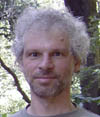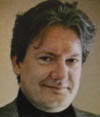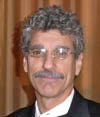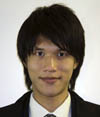Speakers
 |
Professor Jorge Armony Professor Armony obtained first degree in Physics from University of Buenos Aires (Argentina), followed by an MSc in Physics and PhD in Neural Science from New York University (USA). His postdoctoral training was in Oxford and University College London (UK). Professor Armony is currently Associate Professor in Department of Psychiatry and Canada Research Chair in Affective Neuroscience, McGill University; Researcher at the Douglas Mental Health University Institute; and member of the International Laboratory for Brain, Music and Sound Research (BRAMS). |
|||
 |
Professor James Blair James Blair is Chief of the Unit on Affective Cognitive Neuroscience at National Institute of Mental Health (NIMH). Dr Blair received a doctoral degree in Psychology from University College London in 1993 under the supervision of Professor John Morton. Following graduation he was awarded a Wellcome Trust Mental Health Research Fellowship that he held at the Medical Research Council Cognitive Development Unit for three years. Subsequently, he moved to the Institute of Cognitive Neuroscience, University College London. There, with Uta Frith, he helped form and co-lead the Developmental Disorders group, and was ultimately appointed Senior Lecturer. He joined the NIMH Intramural Research Program in 2002. |
|||
 |
Professor John Cacioppo John Cacioppo is the Tiffany and Margaret Blake Distinguished Service Professor at The University of Chicago, Director of the University of Chicago Center for Cognitive and Social Neuroscience, and the Past Director of the Arete Initiative of the Office of the Vice President for Research and National Laboratories at The University of Chicago. Cacioppo’s research is focused on understanding the causes and effects of social isolation. Social species, by definition, form organizations that extend beyond the individual. These structures evolved hand in hand with behavioral, neural, hormonal, cellular, and genetic mechanisms to support them because the consequent social behaviors helped these organisms survive, reproduce, and care for offspring sufficiently long that they too reproduced, thereby ensuring their genetic legacy. Social isolation represents a lens through which to investigate these behavioral, neural, hormonal, cellular, and genetic mechanisms. Evidence from human and nonhuman animal studies indicates that isolation heightens sensitivity to social threats (predator evasion) and motivates the renewal of social connections. The effects of perceived isolation in humans share much in common with the effects of experimental manipulations of isolation in nonhuman social species: increased tonic sympathetic tonus and HPA activation, and decreased inflammatory control, immunity, sleep salubrity, and expression of genes regulating glucocorticoid responses. Together, these effects contribute to higher rates of morbidity and mortality in older adults.
|
|||
 |
Professor Jean Decety Dr Jean Decety is Irving B. Harris Professor of Psychology and Psychiatry at The University of Chicago and its College. Dr Decety received a PhD in Neurobiology from the University Claude Bernard (Lyon, France) in 1989, and then completed a two-year postdoctoral fellowship in Sweden, at Lund University Hospital and at the Karolinska Hospital in Stockholm in the Departments of Clinical Neurophysiology and Neuroradiology. Jean Decety is a member of the Committee on Neurobiology, an Executive Member of the Center for Cognitive and Social Neuroscience, and a member of The Center for Integrative Neuroscience and Neuroengineering. He is the Editor of the Social Neuroscience and serves on the editorial board of Neuropsychologia, Frontiers in Emotion Science, as well as the Scientific World Journal in the domain of higher level brain function. Dr Decety is the co-director of the Brain Research Imaging Center (BRIC) at The University of Chicago Medical Center. |
|||
 |
Professor Tatia Lee Tatia Lee is a registered psychologist and a board certified clinical neuropsychologist who is an elected fellow of the American Psychological Association (both in the Society of Clinical Psychology and the Division of Clinical Neuropsychology). Tatia Lee endeavours to understand how human brain functions. She has been working in collaboration with clinicians and scientists in the field to unravel the magic power of the human brain and to uncover the neural mechanisms underlying those social cognitive affective processes that define the human nature of an individual. She has published extensively and in high impact journals. Tatia Lee is currently Professor of Department of Psychology and Honorary Professor of Department of Psychiatry and Department of Medicine of The University of Hong Kong. Because of her contribution to the advancement of knowledge in Neuropsychology, The University of Hong Kong has bestowed upon her an Endowed Professorship in the field of Neuropsychology, the title of which is “May Professorship in Neuropsychology”. |
|||
 |
Professor Simone Shamay-Tsoory Professor Shamay-Tsoory is the Director of the Social and Affective Neuroscience Lab at University of Haifa. Professor Shamay-Tsoory received a PhD in Neuropsychology from the University of Haifa in 2002 in Israel. Following graduation, she worked in Brookhaven National Laboratories in Long Island, USA, as a Research Fellow and then started teaching in the Department of Psychology in the University of Haifa as a Research and Teaching Fellow for two years. There, she founded the Social and Affective Neuroscience Lab. She was appointed as Associate Professor since 2009. She is interested in understanding the neural mechanisms underlying social cognition and emotional experiences. One focus has been on empathy and ‘competitive’ emotions such as envy and gloating, and another has been on the differentiation and relative importance of emotional and cognitive aspects of theory of mind. She has studied patients with focal lesions in the frontal lobes and psychiatric patient groups. Recently, she is involved in research projects that examine emotional and cognitive brain functions in healthy subjects using imaging and brain stimulation techniques. Professor Shamay-Tsoory is the Vice President of Israeli Society for Biological Psychiatry. She serves on the editorial board of Frontiers in Neuroscience and Social Neuroscience. |
|||
| Forum | ||||
 |
Mr Bolton Chau Bolton Chau is a DPhil student at University of Oxford. His research is mainly on the cognitive neuroscience of decision making and learning. He is particularly interested in understanding how the computational brain integrates choice information to make optimum decisions and how different cognitive and social factors contribute to decision errors. His DPhil study is supervised by Professor Matthew Rushworth and Dr Mark Walton. Bolton obtained his first Bachelor of Science degree in Biochemistry and Psychology at The University of Hong Kong (HKU). His biochemistry thesis was about the molecular mechanism of neural crest development (supervised by Dr Martin Cheung). His psychology thesis was on the neural abnormalities of dementia patients (supervised by Dr S H Cheung). Then, he received his MPhil degree at HKU under the supervision of Professor Tatia Lee and Professor K F So, with his research on the relationships between functions of the frontal lobe. He was awarded the Erik Kvan Postgraduate Scholarship and the Winkler Oxford Award. |
|||
 |
Dr Benson Lau Benson Lau obtained his PhD in neuroscience from The University of Hong Kong, followed by working as a postdoctoral fellow under the supervision of Professor So Kwok Fai. He developed his research interests in behavioral neuroscience during his postgraduate training, particularly in the relationship between neuroplasticity and behaviors. In the past few years, he has actively delivered his research findings in forms of presentation in several international conferences and journal publications. With the use of animal models, his recent work has been on the regulation of adult neurogenesis (formation of new neurons in adulthood) and its significance in sexual and emotional behaviors. Specific recent findings include the discovery that intact neurogenesis is essential for male rodents to display sexual behavior, and the change of neural and glial cell biology by emotional stimulations and stress. |
|||
 |
Dr Kenneth Yuen Dr Yuen received his PhD in clinical psychology from The University of Hong Kong, and completed a postdoctoral fellowship at the Wales Institute of Cognitive Neuroscience, University of Wales Bangor. He specializes in neuropsychological assessments, and cognitive-affective neuroscience research using neuroimaging techniques. His primary research interest lies in investigating the perception, appraisal, and regulation of affective information using a combined approach of functional magnetic resonance imaging (fMRI), physiological measurements and computation modeling. He is also interested in the interactions between affective states and a wide variety of cognitive operations. Currently Dr Yuen is a postdoctoral scientist in the Fear and Anxiety Research Group, Institute for Systems Neuroscience, University Medical Center Hamburg-Eppendorf. |
|||